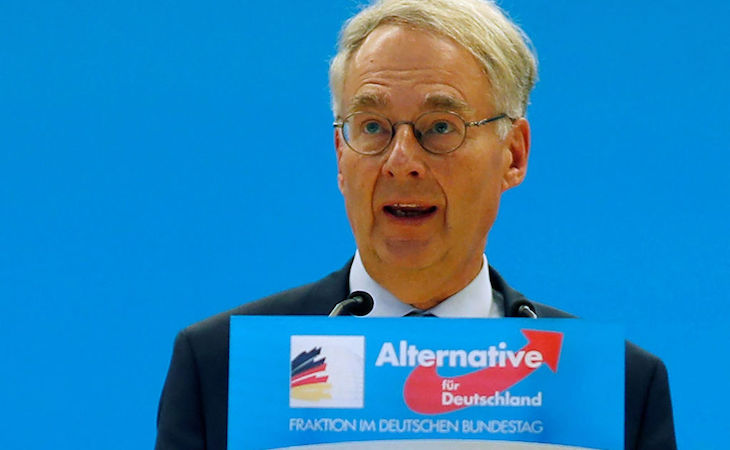It sounds like a scene from a dystopian TV drama: in a country hotel west of Berlin, far-right politicians met neo-Nazi activists and sympathetic businesspeople to discuss a ‘masterplan’ for Germany that involves the forced deportations of millions from the country. But this is no fiction. According to reports in the German media, such a meeting took place last November. These revelations will do little to calm the tumultuous political waters in Germany.
Around two dozen people met at the picturesque lakeside hotel in Potsdam, according to the news outlet Correctiv, which published a detailed report of its undercover investigation. Given the explosive content discussed in speeches between meals, secrecy was paramount for the organisers. Members were invited by a letter seen by Correctiv and the Guardian. The stated purpose of the meeting: the presentation of a ‘masterplan’, presented by ‘none other’ than Martin Sellner.
The AfD contains many individuals with extreme views and plans for Germany
Sellner is the former leader of Austria’s branch of the pan-European Identitarian Movement. Identitarians claim that there is a conspiracy to replace the white populations of the West with non-white immigrants. Sellner himself has engaged in far-right activities since his youth and is therefore permanently barred from the UK on security grounds.
So attendees of the meeting had some idea that the ‘masterplan’ Sellner would present was about the idea of ‘re-migration’. As he confirmed in a statement to the Guardian, this involves ‘deportations…and pressure to assimilate’. According to Correctiv, Sellner argued that asylum seekers, foreigners with residence permits and ‘unassimilated’ citizens should be expelled from Germany, whether they held German passports or not. A ‘model state’ in North Africa with capacity for up to two million was outlined as one option where people could be ‘moved to’.
That this is reminiscent of the Nazis’ Madagaskar Plan of 1940, which proposed to deport one million European Jews to the island each year, where they were to die under terrible conditions caused by overcrowding and a brutal SS regime, is perhaps not surprising given Sellner’s neo-nazi past. What is disconcerting, however, is that politicians were listening who may well have access to power very soon.
Roland Hartwig is said to have attended. A politician of the far-right Alternative für Deutschland (AfD), he was an MP from 2017-2021. Now he is an advisor to co-leader of the party Alice Weidel with much sway over the party’s strategic orientation. According to Correctiv, Hartwig presented himself as a fan of Sellner whose book he was ‘greatly enjoying’. While the AfD denied that the meeting’s content was party policy, it did confirm his attendance.
One current AfD member of the Bundestag, Gerrit Huy, was also present. In a phone call with the Guardian, she confirmed that she had previously presented her ‘party association chairman with plans for a re-migration programme for non-German nationals who can’t find their way into the labour market’ and while the party didn’t adopt the policy, she still supports it personally.

A meeting at which such radical views were discussed, reportedly with wealthy donors present who had been encouraged to give at least 5,000 euros (£4,300) to attend, will raise alarm bells in Germany. Polls are suggesting the AfD is currently Germany’s second most popular party with close to a quarter of the electorate saying that they would vote for them. Elections are scheduled for next year, so one could argue that there is time to turn things around for the government, but trust in the ruling coalition is at a historical low, according to surveys. If nothing changes, a party whose advisors read books about replacement conspiracies will become the second largest political force.
The fear the news about the meeting will trigger might well rekindle Germany’s public debate around combating the rise of the AfD. For years, many centrist politicians have argued for a party ban, something that is constitutionally possible but has only been done twice in the immediate postwar era when a neo-Nazi group was banned in 1952 and the Communist party in 1956. Last year, president Frank-Walter Steinmeier, who, without mentioning the AfD by name, said that ‘the constitution cannot encompass those who are enemies of the constitution’. Saskia Esken, co-leader of chancellor Olaf Scholz’s Social Democratic party (SPD), who feels that ‘this party should be banned’ if it could be proved that it meet the legal requirements for that, has echoed Steinmeier’s comments.
Another strategy to deal with the AfD has been the so-called ‘firewall’, the idea that the other parties would not form coalitions with them and thereby keep it out of power. But this is already proving very difficult at local and municipal level where the AfD is often so strong that governing without it becomes impossible.
It’s also a plan that wouldn’t be viable if the AfD win, as it is currently set to do in three eastern states which are all holding elections later this year. The other parties might simply not have enough votes between them to form a government, at which point the resolve would probably break down. The centre-right Christian Democrats (CDU), Angela Merkel’s old party, for instance, have ruled out a coalition so far, but two of their members are reported to have attended the Potsdam meeting. Party leader Friedrich Merz has also previously suggested a ‘more pragmatic’ relationship to AfD politicians at local level.
The revelations about the meeting of far-right leaders with extremists and wealthy supporters may come as a shock to Germany. It serves as a reminder that the AfD is no mere populist party but contains many individuals with extreme views and plans for Germany. But they bring the country’s centrists no closer to a coherent strategy to regain the trust of the public and pull votes away from the AfD.
The outrage that will follow the details of the Potsdam meeting is likely to focus entirely at the party itself rather than focus minds on the real question that needs urgent answers: why an increasing number of German voters are drawn to it.







Comments